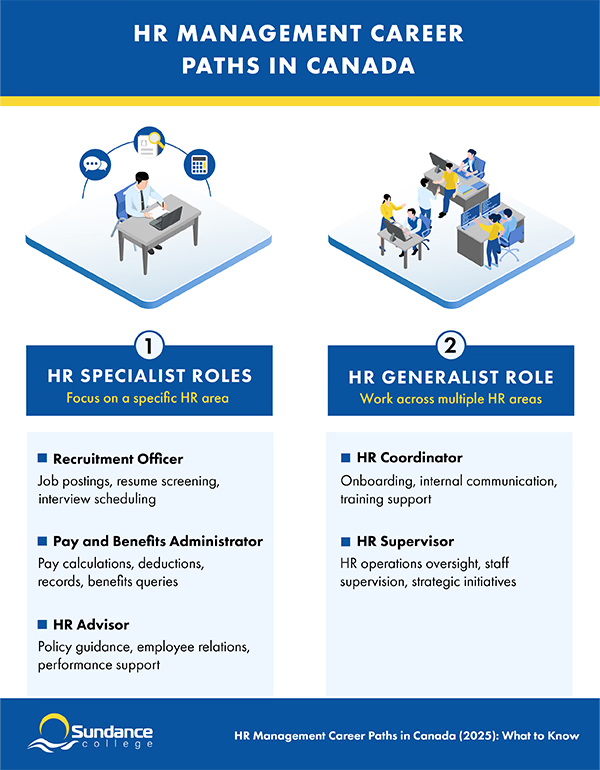Blog / HR Management Career Paths in Canada (2025): What to Know
HR Management Career Paths in Canada (2025): What to Know

Human Resources Management Diploma
- Human Resources Advisor
- Recruitment Officer
- Pay and Benefits Administrator
- Human Resources Coordinator
Table of Contents
You’ve probably gone through the job application process before. But have you ever pictured yourself on the hiring side? Reading resumes, scheduling interviews, guiding new hires, and helping teams work better together. That’s what HR is all about.
As HR demand grows across Canada, it’s a great time to explore this career path.
Here’s everything you need to know about the role: what it involves, the skills you’ll use, career paths, and the HR diploma that gets you started.
Listen to: HR Management Career Paths in Canada (2025): What to Know
What Does an HR Professional Do?
As an HR professional, you’ll support employees and management by coordinating day-to-day HR functions and contributing to a positive work environment. Common HR duties include conducting job analysis, leading interviews, and guiding new team members through onboarding.
You could assist with developing training programs that build employee skills and improve performance. Managing pay structures, coordinating benefits, and answering questions about compensation are also part of HR responsibilities.
When concerns arise, HR may need to be involved. You’ll resolve issues, uphold company policies, and make sure workplace decisions follow Canadian employment laws.
Your involvement in key areas of human resources, including hiring, training, and policy keeps the workplace productive, fair, and responsive.
Skills You Need to Succeed in HR

Working in human resources involves dealing with people, processes, and policies, sometimes all at once. To do this effectively, you’ll need a mix of HR technical skills and HR soft skills, including:
1. Core Competencies
- Recruitment and Selection:
One of the core HR skills is the ability to identify hiring needs, write job postings, and screen candidates effectively. To do this, you need to be skilled in supporting interviews and making informed selection decisions. - Training and Development:
Supporting employee success calls for the ability to deliver training programs that build job skills, strengthen engagement, and contribute to retention. - Compensation and Benefits:
Understanding compensation structures, pay systems, and benefit plans allows you to contribute to pay decisions that attract top talent, boost offer acceptance, and support employee retention. - Employment Law:
You’ll need to recognize legal risks tied to employment relationships and know how to manage them. This includes working with employment contracts, understanding employment-related statutes, and applying provincial labour regulations in everyday situations.
2. Organizational Awareness
When you understand how people, departments, and policies work together, you’re better equipped to support your workplace. Training in Strategic Human Resources Planning and Organizational Behaviour builds your ability to manage people and policies, develop cultural awareness, and guide daily team interactions.
3. Negotiation Skills
Whether you’re finalizing a job offer or addressing workplace concerns, your approach influences outcomes for both employees and the organization. Familiarity with different negotiation styles and when to use them lets you support decisions that reflect policies, legal requirements, and individual needs.
4. Networking and Communication Skills
You’ll need to know how to network within your organization to build rapport, understand department priorities, and coordinate HR efforts. Communication also plays a role in delivering effective presentations and contributing to team discussions.
5. Technological Skills
Proficiency in office tools like Outlook, Excel, Word, and PowerPoint is essential for documentation, communication, and tracking information efficiently.
Each of these reflect the skills that show up on job postings and are essential for supporting both employees and management in building a productive, well-organized workplace.
HR Job Titles to Target
After completing your Human Resources Management diploma, you may qualify for roles in both generalist and specialist areas of HR.
HR Specialist Roles
These positions focus on a specific area of HR, such as hiring or pay & benefits. Common titles include:
- Recruitment Officer:
Assist with the full hiring process, including posting job ads, screening resumes, scheduling interviews, and organizing applicant information. With your HR Management diploma, you’ll be equipped to conduct job analysis, lead interviews, and apply fair hiring practices used in Canadian workplaces. These skills prepare you to support talent acquisition teams from the start, and lead to roles like recruitment manager, staffing manager, or recruitment specialist.
- Pay and Benefits Administrator:
Manage employee pay by calculating earnings, handling deductions, maintaining records, and answering payroll questions, all in line with Canadian payroll regulations. Your HR Management diploma equips you with the skills to understand compensation structures, benefits administration, and how government and union policies affect payroll decisions. These skills support your day-to-day work in pay and benefits, and can lead to opportunities in HR leadership or management roles within benefits administration.
- HR Advisor:
Provide guidance to managers and employees on HR policies, employee relations, and performance management. This mid-level position often comes after experience as an HR coordinator and involves applying policy knowledge to support everyday workplace decisions. The HR Management diploma prepares you in all core areas of human resources, including recruitment, compensation, training, labour relations, strategic planning, and employment law. With this broad foundation, you can support workplace decisions and respond to a wide range of HR needs.
HR Generalist Roles
These roles involve working across multiple HR functions, including onboarding, employee relations, policy support, and training coordination. Common HR job titles include:
- HR Coordinator:
Support onboarding, maintain employee records, manage benefits paperwork, and coordinate communication between departments. You may also help organize training sessions, assist with workplace initiatives, and contribute to daily HR procedures. The HR Management diploma prepares you with practical knowledge in HR processes, compensation and benefits, employment law, labour relations, training & development, and organizational behaviour, making this an ideal starting point for your HR career. With experience, you could move into roles such as HR advisor or HR supervisor.
- HR Supervisor:
Oversee daily HR operations, support junior staff, and contribute to broader HR strategies. The HR Management diploma includes training in strategic human resource planning, employment law, labour management relations, compensation and benefits, training and development, and organizational behaviour. These areas support your work in workforce planning, compliance, employee relations, and team communication. Many professionals move into this position after gaining experience as an HR coordinator.
These HR roles highlight the range of responsibilities in the field and how each position plays a part in supporting people and organizational needs.

HR Roles by Industry
Here’s how the top industries stack up for HR professionals:
1. Public Administration
This sector has one of the highest shares of HR professionals in Canada, making it a major area for those entering the field.
2. Healthcare
This sector has a high concentration of HR staff across Canada, including provincial health authorities, regional health centres, and private clinics.
3.Non-Profit Organizations
This includes churches, charitable foundations, unions, and professional associations, where HR professionals manage staffing, volunteer engagement, and member-focused initiatives.
4. Finance and Insurance
There’s consistent HR demand in this sector, especially in Saskatchewan, Manitoba, Quebec, and Ontario.
By knowing the sectors hiring HR professionals, you can focus your job search and find a better fit for your training and goals.
Salary Outlook & Job Demand
From 2024 to 2033, labour market forecasts suggest steady demand for HR professionals in Canada. This demand is tied to workplace growth and retirements, creating opportunities for those entering the field with the right skills and education.
In 2023, approximately 126,700 people were employed as HR professionals in the country. With 26 percent aged 50 or older and a median retirement age of 64, retirements could create new opportunities in the coming years.
Depending on your responsibilities, experience, and location, you could earn up to $79,996 annually.
These market insights reflect a stable career path if you’re equipped with the right training and skills.
HRM Diploma vs. Degree
A Human Resources Management diploma is shorter than a degree and focused on practical training. The best diploma programs take less than a year, making it a good option for those looking to enter the workforce quickly.
Through a diploma program, you learn to support the full employment cycle and day-to-day HR operations. Graduates often move into positions such as HR advisor, HR coordinator, HR supervisor, recruitment officer, or pay and benefits administrator.
If your goal is to start working in HR quickly, a diploma provides a focused and timely path that prepares you for the demands of today’s workplaces.
How Sundance College Prepares You for a Career in HR
Sundance College’s Human Resources Management diploma is a fast-track HR program designed to help you build the knowledge and workplace habits needed to support employees and contribute across departments right away.
Throughout the program, you’ll build the skills and practicum experience to assist with recruitment, pay and benefits, employee relations, training coordination, and internal communication.
Courses such as Human Resources, Compensation and Benefits, Labour Management Relations, Training and Development, and Networking and Negotiation offer insight into the decisions HR professionals make every day.
You’ll also take Organizational Behaviour, Project Management, and Business Essentials to explore team dynamics, strengthen cross-functional communication, and contribute to daily operations.
John S., an instructor at Sundance College, emphasizes the importance of building both technical knowledge and people skills.
“Working in HR means understanding people as much as you understand policy. That’s why our program focuses not only on the technical side like recruitment, payroll, and employment law but also on communication, negotiation, and organizational behaviour.
Those skills help you support both the team and the company as soon as you begin your first role.”
The program includes a practicum where you’ll apply what you’ve learned in a professional HR setting. This hands-on experience helps you prepare for the responsibilities of your first HR job.
To begin your training, contact an admissions advisor today.
Frequently Asked Questions
-
Can I work remotely in HR roles in Canada?
Yes, some companies in Canada offer remote HR jobs , especially in areas like recruitment, onboarding coordination, pay and benefits, and internal communication.
-
What are the most common entry-level HR job titles?
After completing your diploma, you can qualify for several entry-level HR roles including HR assistant, recruitment officer, and pay and benefits administrator.
-
What is the average salary for HR professionals in Canada?
Your HR salary can vary depending on experience, region, and specific job title. According to current labour market data, HR professionals in Canada can earn up to $79,996 annually.
-
Which industries in Canada hire the most HR professionals?
Public administration employs the largest number of HR professionals across the country. Other major sectors hiring HR include healthcare, finance, insurance, and organizations focused on religious activities, grant-making, advocacy, and member representation.
-
What tools and software should I learn for a career in HR?
You need training in HR analytics and technology, as well as specialized candidate assessment tools, to guide your decisions and support organizational needs. Being comfortable with software like Microsoft Outlook, Excel, Word, and PowerPoint is also important. These tools help you manage communication, organize documents, and keep track of employee information.
-
Is HR a stable career in Canada?
Yes, HR is a stable career in Canada, with 126,700 professionals employed in 2023. Demand is expected to remain steady through 2033, supported by retirements and ongoing hiring needs.
Related Blogs
Subscribe for more career advice
Blog Categories
Share on:
